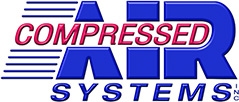
Posted by Compressed Air Systems, Inc. on | Comments Off on How Much Do Compressed Air Leaks Cost?
Compressed air is commonly used in manufacturing and industrial facilities for pneumatic tools, blowers, paint sprayers, material cleaning and handling, and other applications. Like other critical equipment, air compressors, pumps, hoses, tanks, and fittings must be maintained and inspected regularly. Air leaks cause process inefficiencies, wasted energy, and unplanned downtime.
Here we’ll look at the costs of compressed air system leaks, and how leak detection and services from Compressed Air Systems (CAS) can help your bottom line.
Cost of Compressed Air Leaks
Even small leaks can add up to big waste from multiple factors – your facility risks losing more than just pressurized air.
How Much Energy Is Lost Due to Compressed Air Leaks?
Most systems can lose up to 30% of compressed air from leaks. This leads to higher energy consumption, as the system works harder to make up for loss of air and pressure. This cuts into operational efficiency, reduces cycle time, and increases energy expenses.
The exact cost depends on several factors, including:
- The size of the leak
- Compressor efficiency
- System pressure
Compressed Air Leakage Cost Calculation
While small leaks may not appear significant, their costs can quickly add up as the system loses air and overall efficiency.
The following are some example cost estimates:
| Leak Size | Annual Cost (Estimated) |
|---|---|
| 1/16” hole | $500 – $1,000+ |
| 1/8” hole | $2,000 – $4,000+ |
| 1/4” hole | $8,000 – $16,000+ |
The costs listed above are based on a system using compressed air with a pressure of 100 PSI while running continuously at $0.10 per kWh.
Keep in mind that a facility may experience several leaks at once, which multiplies costs. In fact, depending on the extent of the leaks, you could see an increase in energy costs of as much as $500 to more than $16,000.
Other Consequences of Compressed Air Leaks
Additional potential repercussions of leaks include:
- Increased Maintenance Costs. Compressors run for longer periods to compensate for the leak, which contributes to extra wear and tear.
- Reduced Equipment Lifespan. Higher demand on the compressor over time leads to a reduced service life.
- Pressure Drops & Inefficiency. Reduced pressure has a significant negative impact on pneumatic and other air-driven equipment.
- Environmental Impact. Higher energy use expands your company’s carbon footprint.
How To Detect Compressed Air Leaks
The only way to fix a leak is to identify its root cause. There are several common reasons for leaks, and it’s important to check every aspect of the system to find exactly where a leak originates, and if there are multiple problem areas.
Common Causes of Air Leaks
In many cases, compressed air leaks result from worn seals, connections, or gaskets at some point in the system. Other potential causes include corroded pipes or loose fittings, cracked hoses, or faulty quick couplers. Any of these points of failure need to be checked, repaired, or replaced as needed.
Methods of Compressed Air Leak Detection
There are several ways leaks can be detected, including warning signs to watch for during normal operations as well as targeted leak detection methods.
- Listening for Audible Faults. Hissing sounds often indicate compressed air leaks.
- System Pressure Observation and Testing. Pressure levels that drop during typical use or during a test usually indicate a leak.
- Ultrasonic Leak Detection. Specialized equipment listens for and identifies leaks at frequencies beyond what the human ear can detect.
- Soap Bubble Testing. Applying soapy water to the surface of fittings creates a visual indication of a possible leak as the escaped air creates bubbles.
Compressed Air Leak Detection Services From CAS
CAS provides comprehensive leak detection services, including compressed leak audits, which can spot leaks that might be difficult to identify and calculate the loss of energy. We use ultrasonic leak detection equipment to pinpoint where a leak is occurring. We also provide preventive maintenance plans to help you proactively identify and address potential leak issues to keep systems functioning optimally.
Recommended Solutions to Fix Leaks
Routine maintenance is the best way to find and fix leaks. Our team can also replace or upgrade worn components like connectors, hoses, and fittings. Additionally, we can install automated leak detection systems and help you select industrial air compressors and accessories that are highly energy-efficient.
How Much Can You Save?
The right solution can save you up to thousands of dollars in annual energy and leak-repair expenses. Some facilities can save as much as 10 to 20% on energy expenses by preventing leaks.
Our tailored solutions have the ability to increase overall efficiency and subsequently cut energy expenses.
Get a Compressed Air Leak Audit Today
Turn to the experts at Compressed Air Systems to determine whether a leak is compromising system integrity and efficiency. We can conduct a comprehensive audit of your system’s unique configuration with state-of-the-art detection equipment, so you can optimize your equipment, boost efficiency, and reduce energy costs.
CAS serves businesses in Florida and across the country with innovative compressed air solutions. Schedule a leak audit or contact us to learn more about our services and products.







